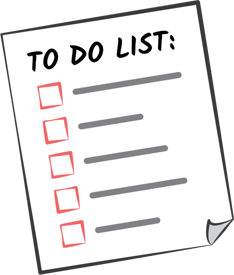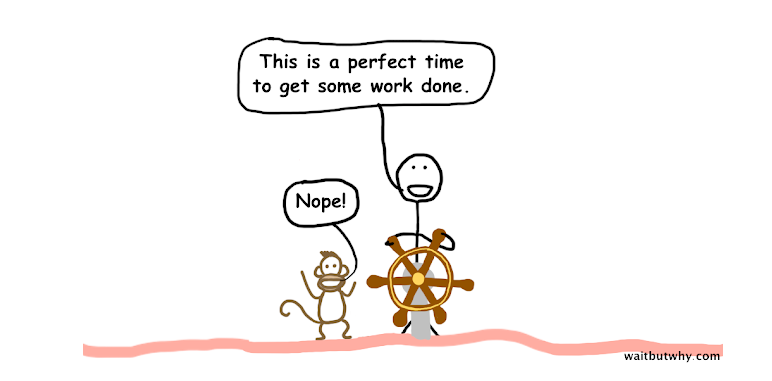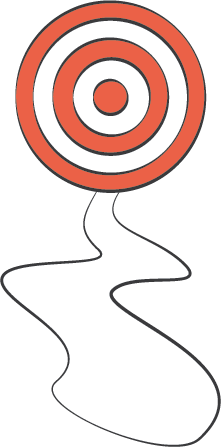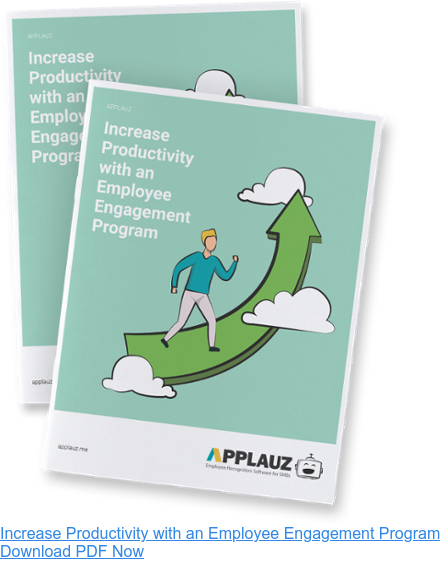Employees are expected to be productive since, well, it's what justifies their pay. However, employees are not always reaching maximum levels of productivity.
In fact, they rarely are.
A report by Atlassian suggests that people are spending only about half the workday on legitimately productive work! It makes you wonder, exactly what are employees doing with their time the other half of the day?
A lack of productivity stems from internal factors such as employees feeling unappreciated to external factors like a noisy office and everything in between.
In extension, these issues also affect employee engagement, since struggling to meet deadlines and producing good work can be demoralizing.
So what can be done to boost productivity?
By observing masters of will power, those envy-inducing people who—seemingly—have it all figured out, we can deduce some universal tactics and strategies for maximum group and individual productivity.
Let's get to the bottom of this, shall we?

Time Management & Productivity Hacks
 1. Plan Better
1. Plan Better
According to a recent study published in the Journal of Applied Psychology, using time management techniques can dramatically improve employee engagement and productivity.
The study explains that planning your workday does wonder for daily motivation and performance in dynamic work environments. However, time management efforts are inefficient when employees suffer from frequent interruptions, which leads to employee frustration.
2. Anticipate Interruptions
It starts with an innocent tap on the shoulder, and one conversation and five emails, and three cat videos later, you're asking yourself: "what was I doing again?"
Studies have suggested that the average worker is interrupted an average of 56 times a day.
 Science has found that the best way to deal with these external interruptions is actually to plan for them. A New York University study, a team of researchers, explored a psychological strategy called Mental Contrasting with Implementation Intentions (MCII) that can be used to help people effectively manage their time.
Science has found that the best way to deal with these external interruptions is actually to plan for them. A New York University study, a team of researchers, explored a psychological strategy called Mental Contrasting with Implementation Intentions (MCII) that can be used to help people effectively manage their time.
Employees facing obstacles in the workplace can use this method to apply an action plan in the form of "facing situation X, I will perform goal-oriented response Z." This means even planning interruptions, which, if you think about it, often occur at a particular time of your workday, and are coming from the same people, either voluntarily or involuntarily.
3. Quit Multitasking
 We know the scenario: you're swamped in work, you're struggling to be productive enough for you to meet approaching deadlines, so you're multitasking.
We know the scenario: you're swamped in work, you're struggling to be productive enough for you to meet approaching deadlines, so you're multitasking.
You have about 15 tabs open on your web browser, and you're bouncing back and forth from task to task.
Bad idea!
Studies have shown that multitasking acts as a downer because employees can't feel any sense of progress, which is fundamental to employee satisfaction.
The mind is not designed to pay attention to two things at once. Although it's possible, the quality of your attention is not the same; as a result, the quality of your work will suffer. The key to maximum productivity, focus your attention on one task at a time. And watch the quality of your work soar.
4. Minimize Distraction
Writer Tim Urban explains—in a funny and informative article—"Why Procrastinators Procrastinate" people who suffer from chronic procrastination have an "instant gratification monkey" living in their mind.
The instant gratification monkey represents a primal and hedonistic part of the human brain, one that is only concerned about doing the bare minimum to feel good in the here and now.

Everybody has an instant gratification monkey, even the most disciplined people. But masters of will power know how to quiet the monkey. How? By intentionally controlling their environment.
When it comes to productivity, the instant gratification monkey does not want to put in any effort. So, one of the best ways to quiet down and tame the instant gratification monkey is by removing and minimizing environmental distractions.
When it comes to the business environment, management can't erase all distractions, but they can certainly help to reduce them.
 To illustrate, let's say that you're a manager in an "open concept" workplace. You should make your employees know that if they want to have an extended chat with someone on the "floor," they should go to the meeting room or lounge area, to not disrupt or distract the flow of others around them.
To illustrate, let's say that you're a manager in an "open concept" workplace. You should make your employees know that if they want to have an extended chat with someone on the "floor," they should go to the meeting room or lounge area, to not disrupt or distract the flow of others around them.
Management must intervene to ensure the office environment is controlled. There should be designated areas set up for deep (and silent) focused work, spaces for collaboration, and finally, areas for free socializing. Ensuring that employees respectfully follow guidelines and utilize the space effectively, you can help minimize environmental distractions as much as possible and remove this prevalent barrier to productivity.
5. Turn big intimidating goals into small tasks
No one builds a house from zero to 100 overnight.
They carefully build a foundation, frame, and lay one brick over and over again until the result is a house.
 People who avoid procrastination aren't some mythical masters born with dispensable amounts of self-control. They are simply better at breaking down a sizable intimidating task into smaller, more manageable goals; at focusing on the bricks rather than the house.
People who avoid procrastination aren't some mythical masters born with dispensable amounts of self-control. They are simply better at breaking down a sizable intimidating task into smaller, more manageable goals; at focusing on the bricks rather than the house.
Ultimately, this helps to manage their anxiety over a given project or task. Because of course, if you only focused on the house, it could be downright paralyzing.
The solution: Managers can help employees with efficiency by ensuring that goals are realistic, actionable, and always organized in order of priority.
In sum, goals that are broken down into more deliverable and manageable mini-tasks clear up the path to success. Work becomes less daunting as a result. When employees feel supported and reassured, anxiety and pressure slowly subside, and the desire to indulge in procrastinating activities simultaneously diminishes.
6. Know when to take a well-deserved break
Masters of self-control and productivity are not unrelenting machines. Their success is dependent on the fact that they know—how and when—to reward themselves. Simply put, they take breaks. And make the most of them by being fully immersed in their relaxation time.
It’s all part of the plan they layout at the beginning of the month, week, and even day. For example, small pauses in between sprints of 90-minutes of productivity have been shown to be a successful productivity strategy.
The lesson for managers: Ensure well deserved breaks and rewards are in sight. Don't delay reward or relegate praising employees to formal evaluations a few times a year. Do it often. Celebrating successes (big and small) should always be a top priority for managers.
Interestingly, 2019 study conducted by Deloitte called "The Practical Magic Of Thank You" found that for their day-to-day work, employees appreciate a verbal and straightforward 'thank you' the most.
Consistent feedback and recognition can be facilitated with the help of engagement and reward programs like Applauz Recognition.
Final Thoughts
American psychologist Roy Baumeister, an expert on self-control and self-esteem, writes in his book "Willpower: Rediscovering the Greatest Human Strength" that "willpower is a muscle that can be strengthened."
You heard right; there's no such thing as being born with more (or less) willpower than another fellow human being. So throw that fatalistic attitude out the window.
Baumeister's research found strong evidence that willpower is a finite resource. In short, a limited amount is available to each of us individually. But similar to strengthening a weak muscle by training at the gym, you can improve and strengthen willpower by deliberately using and exercising it.
Leaders of organizations should take this insight as a nugget of wisdom. Know that with proper knowledge, systems, and training in place, cultivating an environment of positivity and productivity is possible for any team or organization!




